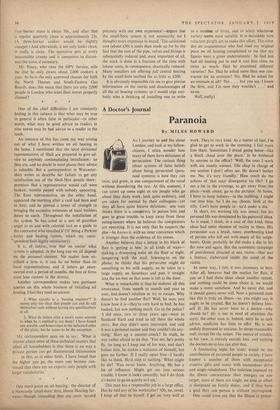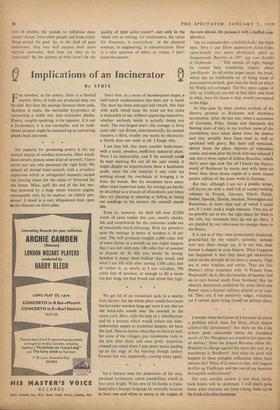A Doctor's Journal
Paranoia
By MILES HOWARD
As I journey to and fro about London, and look at my fellow- citizens, I often wonder how many of them have delusions of persecution. The curious thing about systems of false beliefs about being persecuted (para- noid systems) is how they can exist, and grow, in one compartment of the mind without disordering the rest. At this moment, can count up some eight or ten people who go about their daily work, look quite ordinary, and are taken for normal by their colleagues—yet they all have quite bizarre delusions : one man thinks there is a conspiracy to poison him and goes to great trouble to keep away from those eating-houses where he believes the conspirators are operating. It is not only that he suspects the plot—he knows it, With an inner conviction which is stronger than the evidence of his senses.
Another believes that a tenant in his block of flats is 'getting at him' in all kinds of ways— making a drumming noise on the floor at night, tampering with the mail, listening-in on' the phone; he thinks that his persecutor might do something to his milk supply, so he takes in a large supply on Saturdays and puts it straight into the ice-box so that none is left at the door.
What is remarkable is that he endures all this annoyance, from month to month and year to year, and doesn't retaliate or try to escape. Why doesn't he find another flat? Well, he says, you know how it is—they're very hard to find; he has looked, but saw nothing much. Go to the police? 'I did once, two or three years ago—went to Scotland Yard and tried to tell them the whole story. But they didn't seem interested, and said it was a personal matter and they couldn't do any- thhig.' Start up a counter-attack? In truth, he was rather afraid to do that. 'You see, he's pretty fly. So long as I keep out of his way, and don't bother him, he makes a nuisance of himself, but goes no further. If I really upset him—I hardly like to think. He'd stop at nothing.' What might he do? 'You never know. Anything. He has a lot of influence. Might get me into serious trouble. I know it looks cowardly, but I do think it's better to goon quietly as I am.'
This man has a responsible job in a large office. Has he told any of his workmates? 'Oh, no, never. I keep all that to myself. I get on very well at
work. They're very kind. As a matter of fact, I'm glad to get to work in the morning. I feel more free there. Sometimes I dread going home—like a black cloud over the place.' Is he bothered by anyone in the office? 'Well, the ones I work with are mostly women. The chap in charge of our section I don't often see. He doesn't bother me. No, it's very friendly.' How much do the actions of 'that man' disorganise his life? '1 go out a lot in the evenings, to get away from the place—walk about, go to the pictures. At home, I have to keep indoors—in the building, I might run into him. So I do my chores, look at the telly. Can't have people in—he'd make a din.'
In short, his working life was intact, but his personal life was dominated by his paranoid ideas. As is usual, I think, in a case of this kinds these ideas had some element of reality in them. His persecutor was a brash, noisy, overbearing kind of person who fell out with many of his neigh- bours. Quite probably he did make a din in his flat now and again. But the systematic campaign of punishment directed at one victim—that was a fantasy, elaborated inside the mind of the victim.
In some way, I felt, it was necessary to him. After all, however bad the market for flats, if you or I had these ideas about another tenant, and nothing could be done about it, we would make a move somehow. And he never did, and (I should guess) never will. Now a paranoid state like this is truly an illness—so, you might say, it ought to be treated. But he doesn't believe him- self ill. He has never been to a doctor—why should he? He is not in need of attention (he says); the other man is. Indeed, were he to seek advice, medicine has little to offer. He is not unduly depressed or anxious; he sleeps reasonably well, except for the noises. The source of trouble, in his view, is entirely outside him, and nothing the doctors do to him can alter that.
A fascinating topic for study would be the contribution of paranoid people to society. I have known a number of them with exceptional creative gifts and many with tremendous drive and single-mindedness. The isolation imposed by the illness concentrates their energies on one target; most of them are single, no time or effort is dissipated on family duties, and if they have a goal they can pursue it without interruption.
One could even, say that the illness is protec- tive—it enables the patient to withdraw emo- tional 'charge' from other people and from every- thing except his goal. So, in the field of pure endeavour, they may well surpass their more normal comrades. And how are they to be appraised? By the pattern of their lives? Or the quality of their achievement?—not only in the visual arts or writing, for creativeness, the talent for discovery, is everywhere : in the physical sciences, in engineering, in administration. Here is a nice question of ethics or values. I don't know the answer.











































 Previous page
Previous page